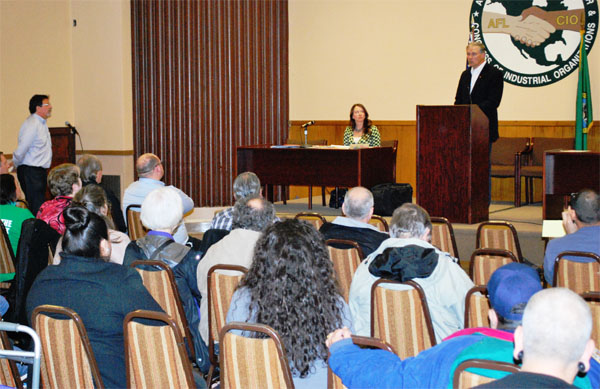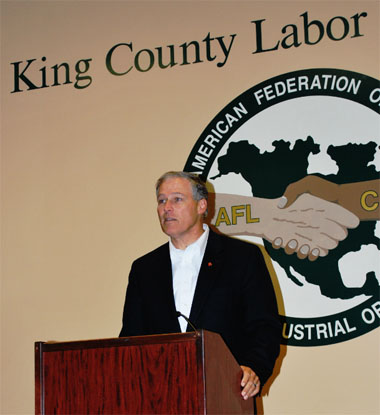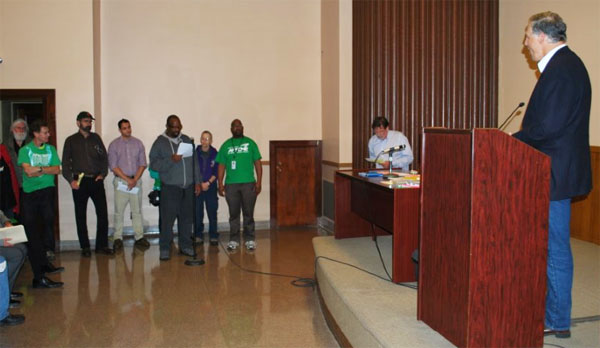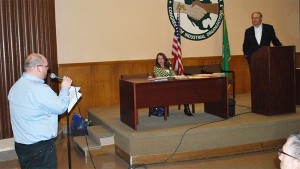STATE GOVERNMENT
Gov. Inslee candid about state’s challenges at MLKCLC meeting
By DAVID GROVES
The Stand
SEATTLE (Oct. 16, 2014) — Gov. Jay Inslee spoke about the challenges facing Washington state at Wednesday night’s delegate meeting of the M.L. King County Labor Council, AFL-CIO, and then took questions in what became a frank exchange about everything from the latest Boeing tax break, to education and transportation funding, to whether state employees will continue to face job cuts.
After welcoming the governor, MLKCLC Executive Secretary David Freiboth expressed the labor community’s sincere condolences on the passing this week of the governor’s father, Frank Inslee.
“I came to understand work and workers because of my dad,” Inslee said. “I learned to respect work and working people because of what he taught me.”

The governor opened his remarks by outlining some of the challenges he will focus on in the next session of the State Legislature, including financing education and making college more affordable, passing a transportation funding package, increasing the minimum wage, and “not allowing erosions of workers’ organizational rights.”
He said that his ability to achieve progress on all of those fronts will be determined by the outcome of next month’s election, and in particular, the makeup of the State Senate.
But it was during the question-and-answer session that the conversation became much more candid.
Boeing tax breaks
Joel Funfar of the Society of Professional Engineering Employees in Aerospace (SPEEA), IFPTE 2001 asked Gov. Inslee about Boeing’s decision to shift engineering jobs out of state after getting an $8.7 billion tax break, the biggest tax incentive in U.S. history, to build the 777X in Washington. And moving forward, Funfar wanted to know whether the governor would work with SPEEA and Machinists (IAM) District Council 751 “to better connect tax incentives with aerospace jobs.”
“Yes, I’m disappointed when Boeing makes a decision to create any job outside of Washington,” Inslee responded, saying that Washington has demonstrated time and again that it has the most efficient workforce and the best aerospace talent pool in the world.
But he said the issue of adding more teeth guaranteeing job retention and job growth to the already-approved 777X deal with Boeing was a “hard question.”
 “We ought to build into these contracts, every protection that we can to ensure the work in the State of Washington,” Inslee said. He suggested that the 777X deal improved upon the previous multibillion tax break for Boeing 787 work in that regard, such as guaranteeing that all 777X assembly will happen in Washington state rather than having additional production lines created in South Carolina or elsewhere.
“We ought to build into these contracts, every protection that we can to ensure the work in the State of Washington,” Inslee said. He suggested that the 777X deal improved upon the previous multibillion tax break for Boeing 787 work in that regard, such as guaranteeing that all 777X assembly will happen in Washington state rather than having additional production lines created in South Carolina or elsewhere.
But he said the Boeing Co. refused to agree to total employment guarantees or to specify levels of engineering jobs as part of the 777X deal.
“Management refused to negotiate those,” he said.
Inslee said he is “concerned” about the idea of renegotiating the 777X deal to add more job protections.
“I would not want to do something to cause that deal to collapse” and jeopardize the 777X jobs that are now being created, he said.
“We should be insisting that Boeing comply with what was in the deal,” Inslee said. “And so far they have.”
Transportation funding package
Marge Newgent of the International Union of Operating Engineers (IUOE) Local 302 asked the governor about the prospects for passing a transportation funding package next year to begin addressing the growing infrastructure problems that are harming the state economy.
“I think you know how committed I am to getting this job done. The need becomes more and more glaring,” Inslee said, reminding delegates that he and the State House of Representatives have stepped up to this challenge, only to have it blocked in the Republican-controlled State Senate. “I’m hopeful voters will give me some legislators that want to do a transportation package.”
The good news, the governor said, is that he is “hearing more chatter” from legislators that there is more interest in approving a package than there was just three or four months ago. The bad news is that he has not heard from the Republican-controlled Senate Majority Coalition that has been the obstacle so far.
Inslee said he has been very flexible in what that package will look like, and is willing to consider “high, low and in the middle” to try to achieve consensus. But “the caucus that controls the Senate thinks that whatever the problem is, the answer is to pay people less money in their wages,” referring to Republican proposals to weaken or repeal the state’s prevailing wage standards.
Public education funding
Dan Jordan of the Seattle Education Association asked the governor about how the state will address the Supreme Court’s McCleary decision that requires the Legislature to invest billions more to fulfill the state government’s “paramount duty” of providing quality public education. And how will he do this, Jordan asked, while also restoring higher education funding that was cut during the recession.
Inslee’s simple answer: “Pass my budget.”
He didn’t offer details on what he will propose later this year to raise the revenue necessary for McCleary, but he said his budget “will take meaningful steps in these areas” and that “this is about our kids, not our jurists.”
“(My budget) is not going to solve the whole of McCleary in the first biennium,” he said. “But it will head in that direction.”
In the meantime, he said he is already talking to different constituencies — from social service advocates to college presidents to organized labor — and telling them that he needs their outspoken support for more revenue if they want to avoid more cuts.
“We’re going to ask legislators to do a hard thing this year,” Inslee said. “We’ve got to share the truth that this needs to happen, and I’ll need your help to do this heavy lifting.”

State employee job cuts
A delegation of state employees expressed concern to the governor about talk of another round of 15 percent budget cuts when they have already suffered dramatic job cuts and six years without cost-of-living pay increases in order to balance the budget in recent years.
After thanking the group for their public service and the sacrifices they have made in recent years, Inslee again said the answer will be to “pass my budget.”
“We’re going to have to raise revenue so we don’t take (McCleary) out on a diminution of state services,” the governor said.
Inslee pointed out that state population has increased 6 percent since the recession and more people means more services are needed. In fact, he said state caseloads are up more than 8 percent over that period. But at the same time, there are 12.5 percent fewer state employees to do the work since the recession because of budget cuts.
“Some people think that you just lay off state employees (to balance the budget). We already did that… We’ve been able to keep the wheels on the truck because you state employees are working harder and finding efficiencies,” Inslee said, thanking the workers for their active participation in his Lean Management initiatives. “But you can’t continue this cutting exercise. We’ve gone down that road already.”
Shared prosperity
 Joe Kendo of the Washington State Labor Council, AFL-CIO outlined the WSLC’s Shared Prosperity Agenda, which includes addressing wage theft, allowing all workers to earn paid sick leave and raising the minimum wage, among other things. He then asked the governor to share his perspective on “how do you create good jobs and create living wages?”
Joe Kendo of the Washington State Labor Council, AFL-CIO outlined the WSLC’s Shared Prosperity Agenda, which includes addressing wage theft, allowing all workers to earn paid sick leave and raising the minimum wage, among other things. He then asked the governor to share his perspective on “how do you create good jobs and create living wages?”
Inslee said we are part of “an entirely new economy” because of profound changes in technology and international competition, an economy where general economic growth does not necessarily translate to good jobs.
“Engineers used to be competing (for jobs) only with engineers in King County,” he said. “Now we’re competing with every engineer in every country on the planet.”
But given that reality, Inslee said, everything that state policymakers do should be “centrally concerned” with rising income inequality and must accept the basic principle: “If you work a 40-hour work week, you ought to have a family wage, where your family can afford to eat and have shelter.”





